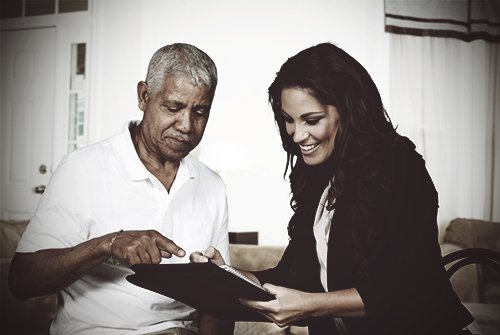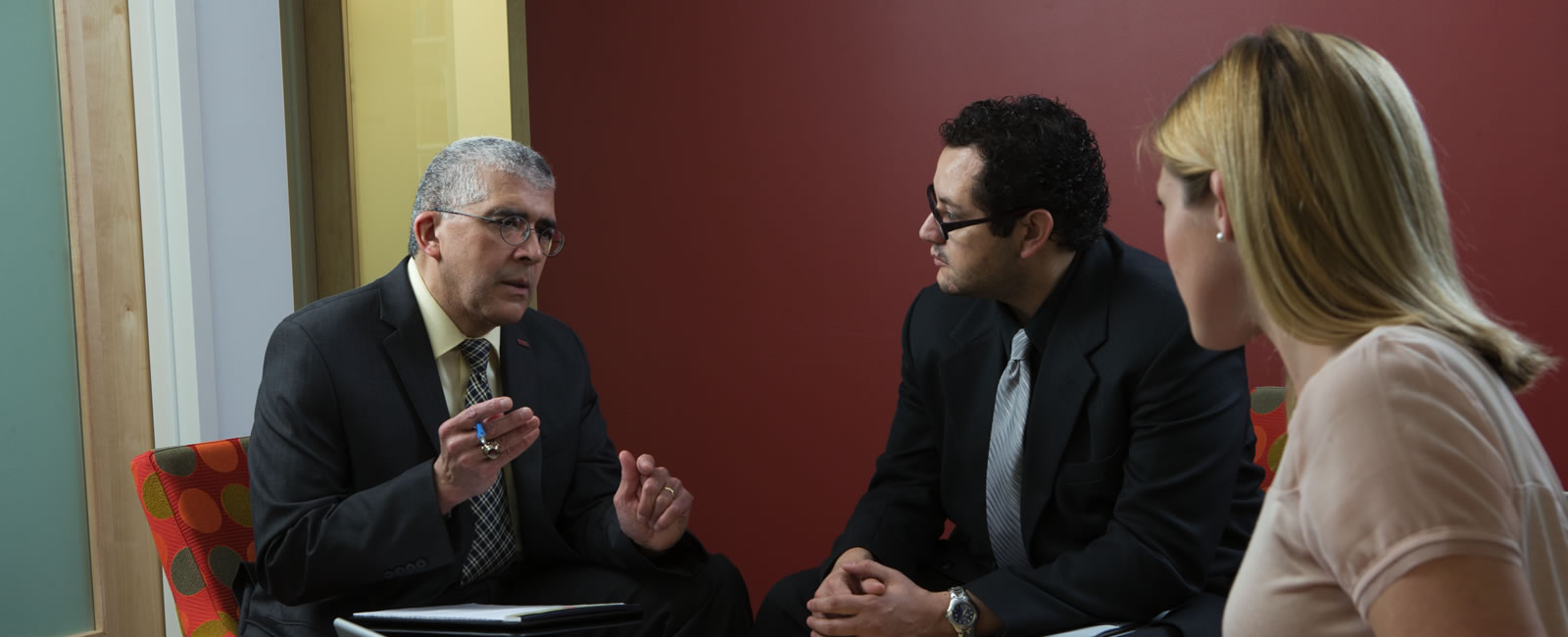
Group counseling is a form of therapy, which posits that people benefit from shared experiences. Usually, it's focused on a particular issue, like drug addiction, marital problems, stress, depression, obsessive-compulsive disorder. While a therapist usually manages the group, contributions from other members are considered valuable since all in the group share similar issues.

Couples counselling, previously known as marital therapy or marriage guidance, addresses the problems arising from adult sexual or intimate relationships. The relationship, rather than the two individuals, is the 'client'.
Our very closest relationship: a marriage; co-habitation or civil partnership, is based on intimacy and trust. When it stops working we are affected deeply and our health and happiness suffer. Our sense of identity and self-worth often rests on the strength of our relationships and we can despair when our prime relationship fails.

Individual counseling is basically a collaborative effort between you and your counselor. Our goal is to provide an open, supportive, and confidential environment for you to address the issues that are concerning you.

Family counselling helps you to understand and cope better with the stresses and strains of family life. Families can be a source of support, encouragement and love but sometimes relationships within families are put under strain and family members feel isolated or overlooked. Family counselling can help when siblings aren’t getting on, or when parents and children are going through a divorce or separation. Forming a new family is a challenge and it is at this point that many parents contact Relate for some support to help everyone settle.
Family counselling is used to encourage conversation between members of the family. Who is going to speak? What is blocking that? What do they want to talk about? It might clarify a new pattern of being together after a marital breakdown or remarriage. It can also help to process feelings of being excluded or rejected which might be otherwise acted out in disruptive behaviour; misunderstood by the other family members. Communication might be repaired or established for the first time. Members may feel supported and encouraged to manage changes with the help of impartial trained family counsellor.

Relationship counseling is the process of counseling the parties of a relationship in an effort to recognize and to better manage or reconcile troublesome differences and repeating patterns of distress. The relationship involved may be between members of a family or a couple (see also family therapy), employees or employers in a workplace, or between a professional and a client.
Couple therapy (or relationship therapy) is a related and different process. It may differ from relationship counseling in duration. Short term counseling may be between 1 to 3 sessions whereas long term couples therapy may be between 12 and 24 sessions. An exception is brief or solution focused couples therapy. In addition, counseling tends to be more 'here and now' and new coping strategies the outcome. Couples therapy is more about seemingly intractable problems with a relationship history, where emotions are the target and the agent of change.
Marriage counseling or marital therapy can refer to either or some combination of the above.

Sometimes children and and their families may need extra support if they are finding it difficult to deal with or understand their emotions and/or behaviour.Counselling children is very different to counselling adults. What we do and how we do it depends on a child’s age, their development, whether they have any specific difficulties. Many people may think that counselling is about talking to our clients about their problem. Actually it is more about listening but children are unlikely to talk for 50 minutes about their problems. We therefore have to use many methods for children to be able to tell us about their difficulty and find many ways to explain to them what might make things better for them.

Sometimes students enter college already having been diagnosed with a learning disability, while other students may wonder if they have a learning disability once they begin their post-secondary education. If not previously diagnosed, students can question if they have a learning disability for a variety of reasons, such as:
Poorer performance on tests and assignments than what they feel they are capable of increased frustration with the learning process
The need to exert an inordinate amount of "effort" for basic academic tasks related to reading and writing
omments from faculty or fellow students that their performance is inconsistent e.g. answers questions well in class but cannot put those ideas on paper either for tests or for assignments
Learning disabilities cannot be cured, and for parents, it can be a difficult and stressful time trying to help their child through education, and making sure they receive the best support possible for their needs. It is important to also focus on the long-term and bigger picture. Explaining the child’s condition to friends, family, and anyone affected can be difficult, but is essential in helping manage the situation.
Making sure the child eats well, sleeps well and gets regular exercise will help them to focus, and teaches them good habits for life.
Talking to the child’s school and GP are the first ports of call, after which the child may be referred to a Child Development Team which includes nurses, psychologists and speech therapists to decide on the best course of action. This may mean the child having additional support at their current school, or moving to a school more suited to their needs.

Career counseling and career guidance are similar in nature to other types of counseling e.g. marriage or psychological counseling. What unites all types of professional counseling is the role of practitioners, who combine giving advice on their topic of expertise with counseling techniques that support clients in making complex decisions and facing difficult situations. The focus of career counseling is generally on issues such as career exploration, career change, personal career development and other career related issues.

Motivational Interviewing is an empathic, gentle, and skillful style of counseling that helps practitioners have productive conversations with individuals with co-occurring and other disorders. Essential characteristics of motivational interviewing include:
Expressing empathy through reflective listening.
Noting discrepancies between current and desired behavior.
Avoiding argumentation and rolling with resistance.
Encourage the consumer's belief that he or she has the ability to change.
Communicating respect for and acceptance of people and their feelings.
Establishing a nonjudgmental, collaborative relationship.
Being a supportive and knowledgeable consultant.
Complimenting rather than denigrating.
Listening rather than telling.
Gently persuading, with the understanding that change is up to the person. Providing support throughout the process of recovery.

Organisational counselling is focuses on the combination of knowledge and skills of counselling theories with organisational behaviour in order to enhance human development in organisational setting and the related areas of personnel management, team building, performance enhancement, executive coaching, career development, training, and employee assistance programs (EAP). The focus of this area will be on the issues pertaining to counselling in organisations, workers’ problems, EAP and intervention models, group counselling and mentoring as well as career counselling.

Counselling is effective in treating mild to moderate depression, and is often combined with medication in more severe cases, which is sometimes known as clinical depression.
Understanding depression and its triggers it can be helpful for sufferers trying to manage the condition. Talking to friends and family or specialist agencies can help. Counselling can help address low self-esteem, or relationship issues or persistent negative thinking.
In most cases help will be available from your GP who can refer sufferers on for psychiatric help, in the cases where it is needed. Exercise is increasingly recommended to help combat the effects of depression and many GP’s can refer those suffering with depression for specialist support.
there are several broad types of counselling that you may be offered. In some counselling services there may be a choice, but in others the counsellors will have a more ‘integrated’ approach. All counsellors tailor what they offer to suit individual needs.

Stress counselling is practiced using techniques such as behavioural therapy. Practitioners using this technique encourage their clients to consider why they react to certain situations and attempt to help them alter their responses. Client-centred therapy is also appropriate for people suffering from stress and explores the reasons why certain events act as triggers for people.
Stress is a part of life that we all encounter from time to time. A little stress can be helpful, kicking us into action to get things done; but too much can affect us both mentally and physically. Stress is the second major cause of illness at work after back pain, and is becoming more and more of an issue in today's culture.
In a stressful situation our brains release a range of 'stress chemicals' such as cortisol and adrenaline to provoke a fight-or-flight reaction. The fight reaction will have us standing up, ready to fight for our lives, while the flight reaction encourages us to flee from danger and protect ourselves. When we are immobile (for example in an office or car) these stress chemicals can build up and affect our immune system and blood pressure.
Everybody is unique and stress affects people in different ways - some thrive off it, while others find it incredibly difficult to deal with. How we react to stress depends on a variety of factors, including our personal temperament and the type of stress we're dealing with.
In life we generally encounter two types of stress; the first is the constant stream of everyday pressures like deadlines and bills, and the second is the sudden rush of stress brought on by one-off events such as death, moving house or divorce.

If you do have suicidal thoughts, then talking through those feelings with a counsellor could help you to come to terms with them and help you to realise that your life is worth living. Suicidal thoughts are most commonly addressed using a relatively new form of counselling specially adapted form of cognitive behavioural therapy (CBT). It aims to show you that no matter how destructive your behaviour is, it still makes sense - it is still a valid coping mechanism. You will learn to replace destructive behaviours with behaviours that allow you to move on to a better place in life.

If you are considering or are hesitant about seeking some help with your drinking there are number of points worth considering:
You are not alone as alcohol problems are very common in India prevalence.
Most people who visit Psychology with drinking problems appear on first impressions to be happy and functional people, holding down respectable jobs.
People with drinking problems or alcohol addiction come from ‘all walks of life’. We have successfully treated a broad range of peoples.
We treat people with drinking problems on a daily basis and will not unfairly judge or label you.
We have a number of Counsellors, Psychologists and Psychiatrist on the team that have specialised in Drug and Alcohol Problems. They have gained postgraduate training in the area and have worked for a range of Government organisations that specialise in the treatment of drug and alcohol addiction.
If you are considering or are hesitant about seeking some help with your drinking there are number of points worth considering:
You are not alone as alcohol problems are very common in India prevalence.
Most people who visit Psychology with drinking problems appear on first impressions to be happy and functional people, holding down respectable jobs.
People with drinking problems or alcohol addiction come from ‘all walks of life’. We have successfully treated a broad range of peoples.
We treat people with drinking problems on a daily basis and will not unfairly judge or label you.
We have a number of Counsellors, Psychologists and Psychiatrist on the team that have specialised in Drug and Alcohol Problems. They have gained postgraduate training in the area and have worked for a range of Government organisations that specialise in the treatment of drug and alcohol addiction.
Treatment may include a combination of the following:Moderated drinking plans
An agreed period of abstinence
Understanding and addressing the functions of your drinking
Restructuring problematic thought patterns
Relationship Counselling
Treating depression and anxiety
Making lifestyle changes
Referral for Detoxification
Referral for Medical Support
Monitoring drinking behaviours with drinking diaries
Anger management
Assertive communication
Identifying and removing high-risk areas and triggers
Introducing new adaptive behaviours
Providing drinking refusal skills

Counselling, both individual and group, is animportant aspect of substance abuse de-addiction. Counsellors are often experts in psychology and can help patients understand and conquer their addiction. Without proper counselling, the addict might never recover.
It is carried on over a period of time. The length of which is dependent upon the needs of the client. Each client is given minimum of 3-4 sessions, which lasts for about 30-60 minutes. Issues relating to personal or problems such as extra marital affairs, legal issues, marital separation are dealt.
A homogeneous group of individuals are brought in for a group discussion. The Group of Participants can consist of persons who are dependent or addicted to chemical substances, alcohol, cannabis, tobacco, etc. The number of participants in a group is 5 - 10 Members with a counselor. Each client is taken to participate in two sessions where the session runs in to time of about 30- 60 minutes per session.

The goal is to get rid of old attitudes that got in the way of enjoyable sex, establishing new attitudes that increase sexual responsiveness.
If the problem relates to your relationship, couples counseling is recommended. The couples therapist is trained and experienced at helping couples recognize, understand, and solve their problems.First, the counselor explores the relationship to find the trouble spots. The counselor will recommend exercises and activities that will improve the couple's communication and trust. If that can be accomplished, often the sexual problem can be solved more easily. A sex therapist may take couples therapy one step further by focusing on the couple's physical relationship. After identifying the couple's attitudes about sex and the sexual problem, the sex therapist recommends specific exercises to re-focus the couple's attention and expectations.
Sex counselling can help a woman identify problems in her life that may be expressed as sexual problems. For some women these problems are fairly clear, including past sexual or other abuse, rape, or traumatic sexual encounters.For others, the problems may be less clear-cut, involving unresolved emotional issues or dissatisfaction with other areas of life. In either case, the therapist usually focuses on resetting the woman's attitudes toward sex.
Specific objectives may include any of the following:Learning to relax and eliminate distractions, Learning to communicate in a positive way what you would like, Learning nonsexual touching techniques, Increasing or enhancing sexual stimulation,
Minimizing pain during intercourse,Sex therapists often use what are called "sensate focus" exercises to treat sexual problems. The exercises start with nonsexual touching and encourage both partners to express how they like to be touched. The goal is to help both partners understand how to recognize and communicate their preferences. Sex therapists can recommend exercises to help with vaginismus.

Psychological Counselling aims to help people manage their difficulties and transform personal problems into their own personal growth.
Who is it suitable for counsellingPsychological counsellors work with individuals, couples and groups (such as families). All counselling work is, of course, completely confidential.
What kinds of problems can it help counsellingPsychological counselling is help to individual and group for any psychological, emotional, behavioural and family problems as individual faced with difficult stages in their normal life, fears, panics and anxieties, depression and sadness.
Psychological Counselling is help to you in
Psychological problems
Emotional problems
Child behaviour problems
Crises in relationships
Stress and other pressures
Fears, panics and anxieties
Family problems
Difficulty with decisions making
Depression and sadness
Psychological counselling can help enable you to:
develop more fulfilling relationships
bring out your creativity and self-expression
learn to assert your own needs
renew a sense of purpose in your life
find paths to self-discovery
feel happier within yourself

When you begin counseling session, you will begin with an intake evaluation, which may take two or more sessions. This evaluation will help your counselor understand the problems that need to be addressed.
Based on a deeper understanding of the nature and degree of the problem, the counselling sessions will review the various situations and relationships that may be troublesome for you. Specifically, we will want to learn the kinds of thoughts and assumptions you may have, what behaviours you engage in that are rewarding or punitive to yourself or others, and your style of communicating and listening.
Client and counsellor sit in private and engage in a lot of talking and listening. Each session typically lasts between 50 minutes and one hour. Sometimes just a single session is sufficient for a client's needs, but more usually client and counsellor continue to meet for several weeks or even months. Client and counsellor plan together how often and for how long to meet.
Couples meet with the counsellor in the same way and may use the sessions to better understand how they communicate and react to each others needs. Many couples find attending alternate individual and joint sessions to be especially helpful.
With each session we review your experience in the previous session, your intersession tasks, one or two current problems, a review of what you've accomplished in this session, and task setting for the next meeting.
